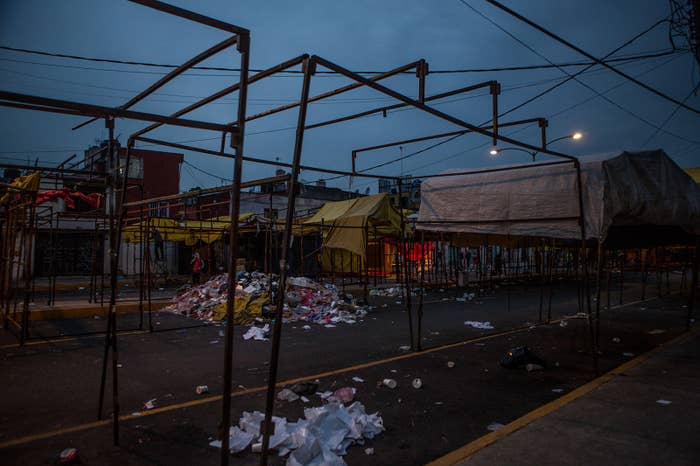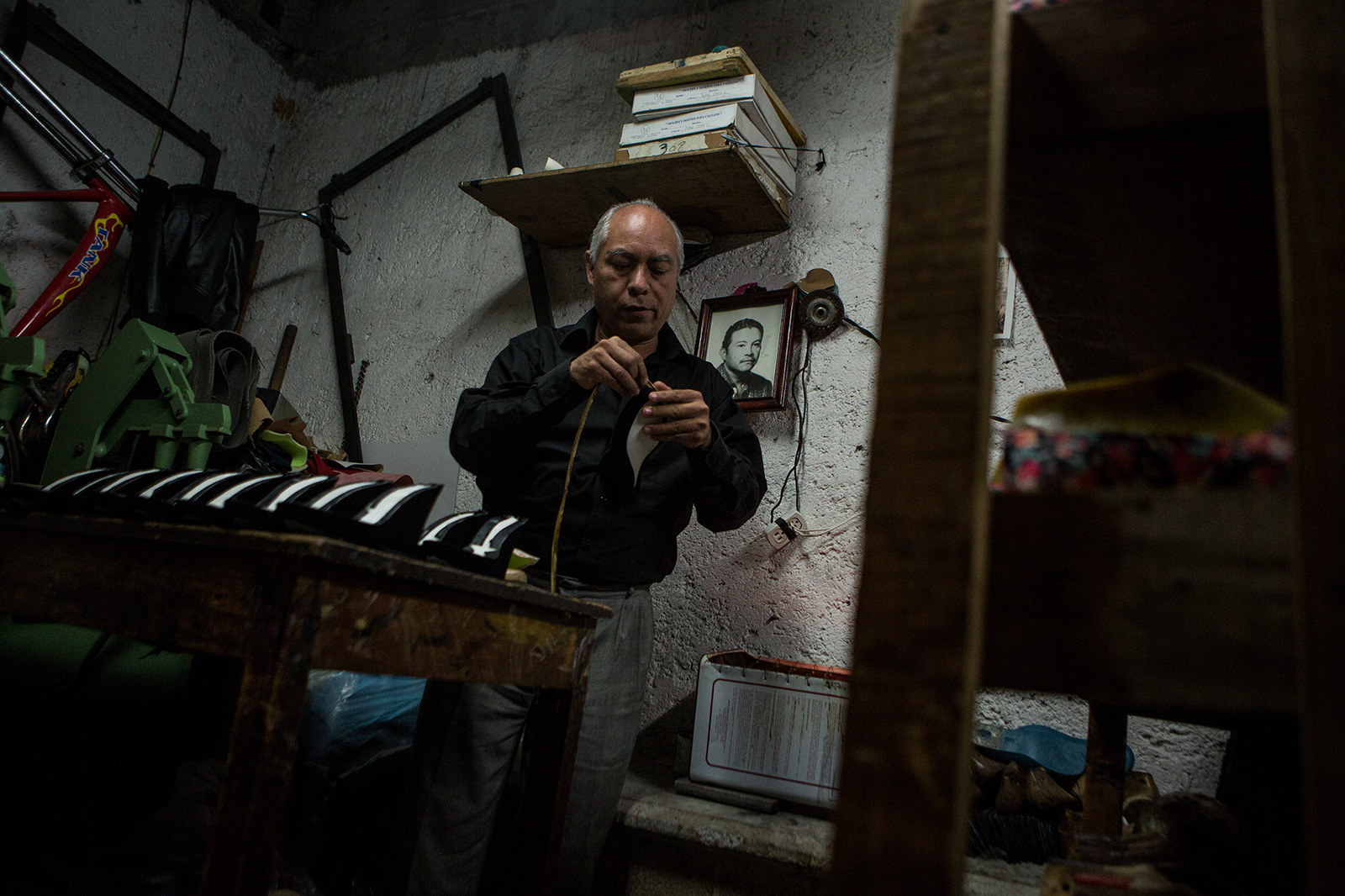
MEXICO CITY — It was an unlikely scene: A convoy of motorcycles carrying wide-eyed theatergoers swerved around cars and revved onto sidewalks in Tepito, Mexico City’s biggest contraband hub and a virtual no-go zone for many in the capital. Actor Noé Hernández led the group through a narrow passageway connecting worn-down housing projects and stopped outside Lourdes Ruiz’s ground-floor apartment.
“I shared her food, her bed, her conflicts, her loves, and her heartbreaks,” Hernández said, his voice breaking with emotion, before ushering the small crowd into the first makeshift stage of the night.
Tepito, referred to as Barrio Bravo, or “Fierce Neighborhood,” is in some ways the heart of Mexico City, though many never dare go. It has a bustling open-air market that dates back to Aztec times and blocks that snake seemingly endlessly, but is known more today for the frequent confrontations between residents and riot-geared police.
Its motto is “Tepito exists because it resists.” The neighborhood gained notoriety in 2013 when 12 young people disappeared after attending a party in the lively Zona Rosa District — their bodies were discovered three months later at a mass grave on the outskirts of the city.

The neighborhood is heavily stigmatized as an unwelcoming mini-city filled with drugs, violence, and screaming excess. That reputation follows its residents like a scarlet letter when they venture past its borders.
But on this night, it was all about different worlds colliding to break down barriers and wash away labels. Or were the worlds so different, after all?
Ruiz, a feisty woman with strong features and a don’t-cross-me attitude who sells clothes at a stall in the local market, appeared in her living room, barely large enough to sit the eight-person audience. She laughed while exchanging sexual innuendos with Hernández, one of the show’s actors, who wore jeans and a Gap sweatshirt.
The banter quickly morphed into a painful reckoning of alcoholism and failed relationships, the death of a parent and the shame of attending school barefoot. Ruiz inched closer to Hernández as she prodded him to talk about his father’s beatings and his stutter, which gets worse when “[he's] talking to someone that is superior to [him].” Hernández braided Ruiz’s hair when she spoke of rolling around in the earth at a cemetery after finding out she had cancer and having to decide whether to unplug her mother’s life support after a fifth heart attack.
Hernández and Ruiz were taking part in an immersive theater production called Safari en Tepito. It's directed by Daniel Giménez Cacho, a well-known actor who has worked with Academy Award-winning director Alfonso Cuarón, and is based on Dutch actress and writer Adelheid Roosen's similar project, which took place in an immigrant district in the Dutch city of Utrecht.
It’s these performances that provide the brief moments when we see “the Lourdes that we don’t see outside, shouting, ‘What size!?’” said Hernández, addressing the audience, which was drinking tequila from small shot glasses and snacking on beans and tortillas.

“I wanted it to be an encounter with the Other,” Giménez Cacho told BuzzFeed News. The other who is “far away, who we are afraid of, who we don’t know, who is criminalized,” added the 53-year-old actor, who immersed himself in Tepito while directing Crońica de Castas, a TV series about the neighborhood and its residents that aired last year. Giménez Cacho has always been fascinated by Tepito, perhaps because, as the son of Spanish immigrants, he is constantly looking for a sense of belonging.

This was the second edition of Safari en Tepito — the first one, last year, had half as many acts. Eight actors were paired up with “adoptive relatives” in Tepito. For two weeks, the actors lived in the resident’s house, shadowing their partner throughout the day, often laying side by side at night and sharing their deepest fears, scars, and hopes. Afterward, the actors debriefed Giménez Cacho, who wrote scenes based on the exchanges between the pairs. Months of rehearsals followed, in tandem with a major logistical operation.
The resident-actor duos have become like family since the production began. “This changed my life,” said actress Patricia Ortiz while leading the audience across a busy street, single-file. “They opened their doors,” said Ortiz, moved by the trust her adoptive relatives conferred in her from the beginning.
“The only way to rebuild the social fabric of the neighborhood is to do it with culture,” said Mayra Valenzuela, one of the residents. “And what do I get? A ton of friends, solidarity, empathy. Values,” she added.
The shows, which opened in late February and will continue through March 29, have been selling out quickly, with groups of 10 ticket holders walking at a brisk pace through the market, stepping over trash, flanked by actors in the front and “route helpers” behind. One of the motorcycle drivers said the groups are being protected, albeit invisibly, by police and others.

Tepiteños, as people from the neighborhood are called, “have a very rooted culture and I want to understand why it has become that way,” said Milagros Rodríguez, a public health master's student from Monterrey, in northern Mexico, who attended the show. The perception Rodríguez came into the performance with is one shared by many: that generations of Tepiteños stay in the neighborhood, inheriting their parents’ trade and then passing it on to their children. As she waited on the subway platform for the tour to begin, Rodríguez wondered if she should take off her watch while clutching her purse close to her chest.
Later on in the evening and slightly more relaxed, Rodríguez watched closely as a balding man sat hunched over a table, gluing soles onto shoes. Eduardo Rosales, a second generation shoemaker, said he works from dusk till dawn alongside his wife so that their daughters can leave Tepito, make something of themselves, and then come back.
One of his daughters, Irene, paired up with Ortiz. Young and bright-eyed, the two shared the deep desire within them to “eat the fucking world,” even yelling those words repeatedly while clutching each other’s hands as they stood atop a small, plastic table in the middle of the living room. But then, they revealed the traumas that started whittling away at the bravado they’d displayed: for Ortiz, a mother who left her one Christmas Day and then, when she got to Mexico City from her home state of Sonora to pursue an acting career, an accident on a stage that left other actresses seriously injured and her with painful remorse.

For Irene, who dreams of becoming a journalist, an older sister who has blamed her for their parents’ arguments, even telling her at one point that she wished Irene hadn’t been born, and a former boyfriend who was sent to prison after a man he beat up during a fight accused him of theft. One day, said Irene, she went to visit him in prison — she remembers the guards patting her down excessively before letting her in — and began to cry when she saw his shirt had been cut up to reveal his burned skin from a childhood accident. “Don’t cry or they will do worse things to me tonight,” he told her.
Irene, 22 — who attends university in the morning, works at her parents’ shoe workshop in the afternoons, and gives Zumba classes at a local gym in the evenings — said she is proud to be a Tepiteña, even if it means being seen by many middle- and upper-class Mexicans as a drug addict, a drunk, and a lazy person who is unlikely to go to school. Even her sister has accused her of being a drug addict, but Irene says that it’s the shoe glue that makes her woozy. Sometimes, after several hours of work, Irene has to drink milk to cut down on the unwanted effects of the solvent.
“I hate labels,” said Irene, who also works as a stilt walker at parties to make some money on top of her other jobs. The first time she took her mother to watch her perform, she was afraid of her reaction. “I just wanted her to be proud,” said Irene, wiping tears from her young, slightly blemished cheeks.
Safari en Tepito is co-produced by Mexico City’s secretary of culture, an Interior Ministry program for the prevention of violence and crime, and the Embassy of the Netherlands, among others. More than 80 people participate in the production.
Giménez Cacho said he is planning to create a similar theater experience in Ciudad Juarez, on the U.S.–Mexico border, which was hard hit by drug war-related violence for years, earning the city a reputation as a homicide hub. “This is a peace project,” he said.
As Rodríguez, the student from Monterrey, walked out of the farewell party where the different actors and their audiences came together to eat tacos and mingle with the cast, she said the experience was eye-opening. “Life is hard for everyone … it’s great that Tepiteños characterize themselves as strong.”
“I wouldn’t take the fierce out of Tepito, ever,” she added.
